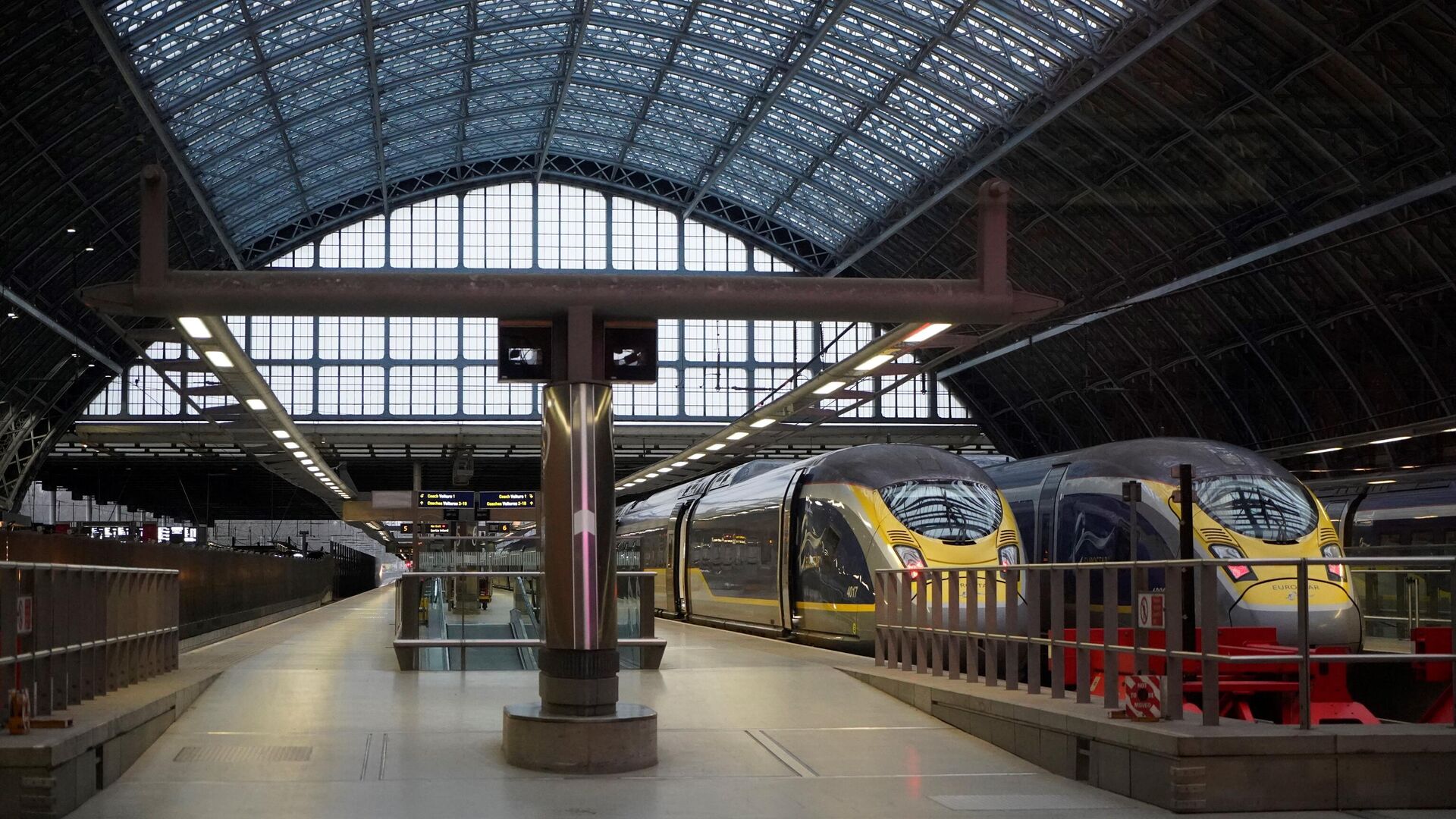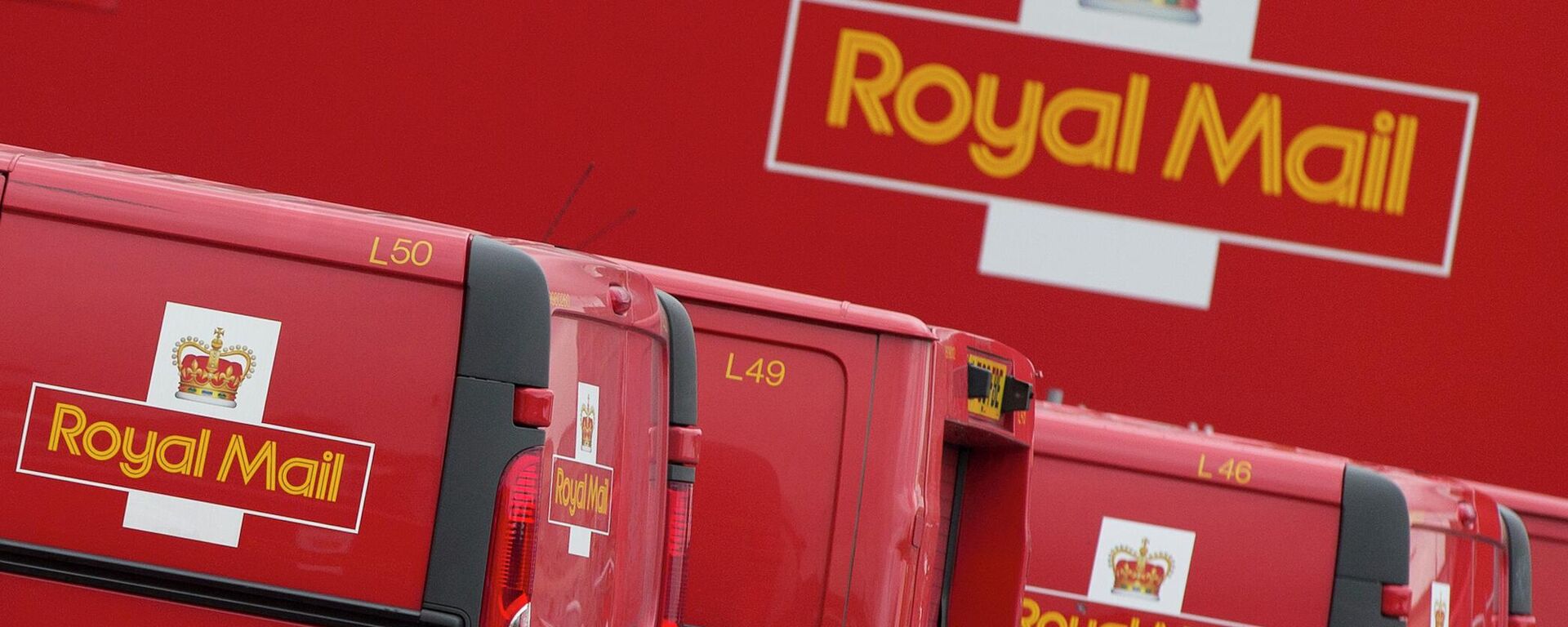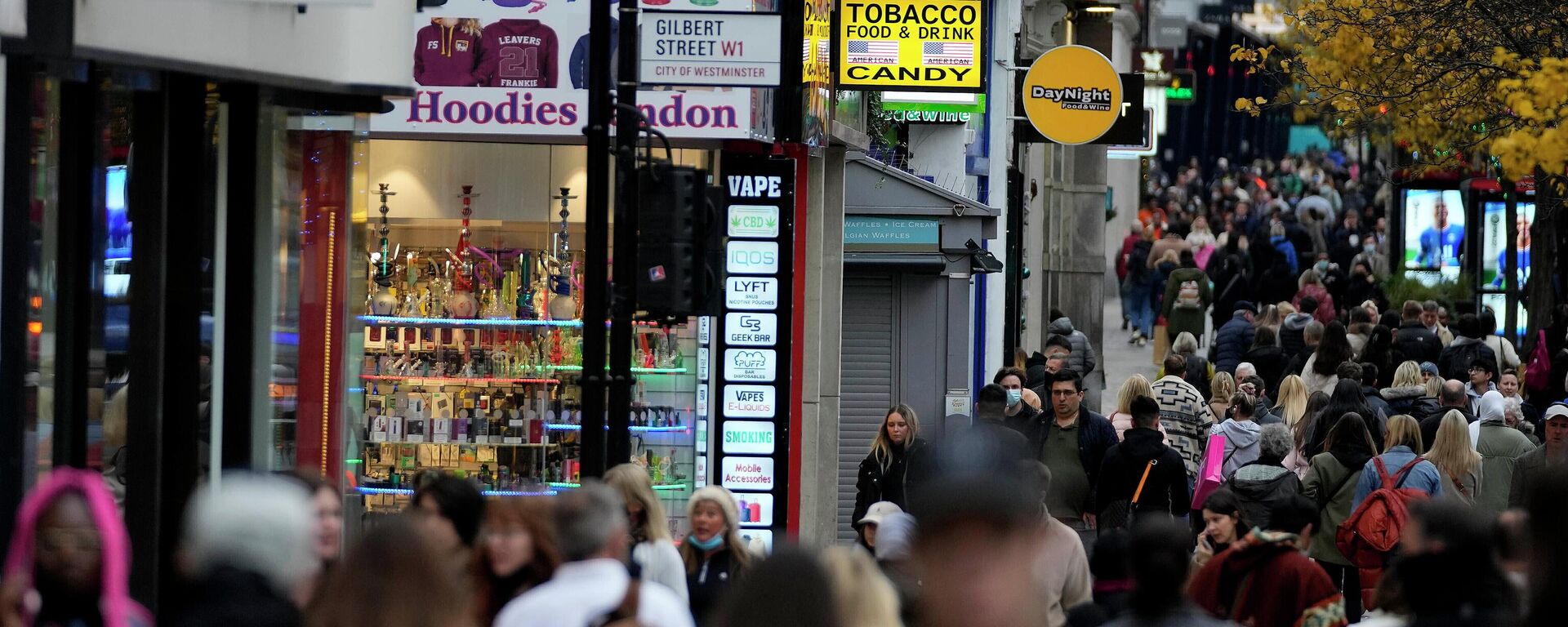https://sputnikglobe.com/20220521/biggest-rail-strike-in-uks-modern-history-looms-as-countrys-inflation-increasing-1095679423.html
Biggest Rail Strike in UK’s Modern History Looms as Country’s Inflation Increasing
Biggest Rail Strike in UK’s Modern History Looms as Country’s Inflation Increasing
Sputnik International
A massive industrial strike at the UK’s Network Rail over the company’s plans to reduce 2,500 engineering jobs may kick off already on 7 June. The Rail... 21.05.2022, Sputnik International
2022-05-21T06:15+0000
2022-05-21T06:15+0000
2023-05-28T15:19+0000
trade unions
government
inflation
united kingdom (uk)
https://cdn1.img.sputnikglobe.com/img/07e6/05/15/1095679748_0:160:3073:1888_1920x0_80_0_0_a56fb8fae16991b7099c94fcc482d04b.jpg
UK Transport Secretary Grant Shapps is due to meet Prime Minister Boris Johnson next week to discuss emergency plans aimed at stopping what may become Britain’s biggest rail strike in modern history, The Financial Times (FT) has reported.The newspaper quoted unnamed industry executives as saying that the British infrastructure operator Network Rail had warned that in a worst-case scenario, the railway would be forced to go down to running a 12-hour-per-day service.The emergency plans are also expected to include freight trains being given priority over passenger services to tackle potential food and fuel shortages due to the looming strike.This comes as the UK’s Rail, Maritime and Transport Workers (RMT) union urged more than 40,000 railway workers to vote in favour of a strike in a ballot that is slated to wrap up on 24 May.The RMT is unhappy over Network Rail’s push for cutting at least 2,500 maintenance jobs, and what the union describes as an “attack” on pay and conditions at train operating companies.The ballot is being held among RMT members on Network Rail and the country’s 15 train operators, including Chiltern Railways, CrossCountry, Greater Anglia, LNER, East Midlands Railway, c2c, Great Western Railway, Northern Trains, Southeastern, South Western Railway, Island Line, GTR (including Gatwick Express), TransPennine Express, Avanti West Coast, and West Midlands Trains.The remarks followed RMT General Secretary Mick Lynch stressing that his union believes in “modernising the railways” but that it doesn’t believe in “sacrificing thousands of jobs, constant pay freezes or making the railways unsafe”."That is what government plans will mean for the railways if RMT and other transport unions don’t mount a comprehensive defence of the industry,” Lynch pointed out.He expressed concern about the fact that “railway workers have had to contend with pay freezes, the prospect of losing their jobs and repeated attacks on their terms and conditions”.The developments unfold as salary increases across Britain fail to keep up with a soaring rate of inflation that hit 7% last month and is set to skyrocket to 10%, according to the Bank of England’s estimates.He was giving evidence to the Treasury Select Committee amid criticism from senior Tories about his response to growing prices driven by inflation surging well past the government’s target of 2%. This comes as the growing cost-of-living crisis continues to take its toll on UK consumers, with increasing inflation induced by record energy prices, post-COVID-19 pandemic supply chain disruptions and the fall-out from the sweeping sanctions that Western countries slapped on Russia over its ongoing special military operation in Ukraine.
https://sputnikglobe.com/20220519/uk-royal-mail-plans-more-cost-cuts-because-of-inflation-1095626910.html
https://sputnikglobe.com/20220512/uk-economy-shrinking-amid-rising-inflation-1095453315.html
united kingdom (uk)
Sputnik International
feedback@sputniknews.com
+74956456601
MIA „Rossiya Segodnya“
2022
Oleg Burunov
https://cdn1.img.sputnikglobe.com/img/07e4/09/0b/1080424846_0:0:2048:2048_100x100_80_0_0_3d7b461f8a98586fa3fe739930816aea.jpg
Oleg Burunov
https://cdn1.img.sputnikglobe.com/img/07e4/09/0b/1080424846_0:0:2048:2048_100x100_80_0_0_3d7b461f8a98586fa3fe739930816aea.jpg
News
en_EN
Sputnik International
feedback@sputniknews.com
+74956456601
MIA „Rossiya Segodnya“
Sputnik International
feedback@sputniknews.com
+74956456601
MIA „Rossiya Segodnya“
Oleg Burunov
https://cdn1.img.sputnikglobe.com/img/07e4/09/0b/1080424846_0:0:2048:2048_100x100_80_0_0_3d7b461f8a98586fa3fe739930816aea.jpg
trade unions, government, inflation, united kingdom (uk)
trade unions, government, inflation, united kingdom (uk)
Biggest Rail Strike in UK’s Modern History Looms as Country’s Inflation Increasing
06:15 GMT 21.05.2022 (Updated: 15:19 GMT 28.05.2023) A massive industrial strike at the UK’s Network Rail over the company’s plans to reduce 2,500 engineering jobs may kick off already on 7 June. The Rail, Maritime and Transport Workers union’s General Secretary Mick Lynch said that “thousands of railway workers” had seen their living standards “plummet” and had “run out of patience”.
UK Transport Secretary Grant Shapps is due to meet Prime Minister Boris Johnson next week to discuss emergency plans aimed at stopping what may become Britain’s biggest rail strike in modern history, The Financial Times (FT) has reported.
The newspaper quoted unnamed industry executives as saying that the British infrastructure operator Network Rail had warned that in a worst-case scenario, the railway would be forced to go down to running a 12-hour-per-day service.
The emergency plans are also expected to include freight trains being given priority over passenger services to tackle potential food and fuel shortages due to the looming strike.
This comes as the UK’s Rail, Maritime and Transport Workers (RMT) union urged more than 40,000 railway workers to vote in favour of a strike in a ballot that is slated to wrap up on 24 May.
The RMT is unhappy over Network Rail’s push for cutting at least 2,500 maintenance jobs, and what the union describes as an “attack” on pay and conditions at train operating companies.
The ballot is being held among RMT members on Network Rail and the country’s 15 train operators, including Chiltern Railways, CrossCountry, Greater Anglia, LNER, East Midlands Railway, c2c, Great Western Railway, Northern Trains, Southeastern, South Western Railway, Island Line, GTR (including Gatwick Express), TransPennine Express, Avanti West Coast, and West Midlands Trains.
An unnamed union official was cited by the FT as saying that it remains unclear whether the RMT would carry out rolling actions or “one big action” combining Network Rail and the train operators. According to the source, the earliest first day of any strike is scheduled for 7 June.
The remarks followed RMT General Secretary Mick Lynch stressing that his union believes in “modernising the railways” but that it doesn’t believe in “sacrificing thousands of jobs, constant pay freezes or making the railways unsafe”.
"That is what government plans will mean for the railways if RMT and other transport unions don’t mount a comprehensive defence of the industry,” Lynch pointed out.
He expressed concern about the fact that “railway workers have had to contend with pay freezes, the prospect of losing their jobs and repeated attacks on their terms and conditions”.
“Removing 2,500 safety-critical jobs from Network Rail will spell disaster for the public, make accidents more likely and will increase the possibility of trains flying off the tracks”, the RMT general secretary said, adding that “thousands of railway workers” had seen their living standards “plummet” and had “run out of patience”.
The developments unfold as salary increases across Britain fail to keep up with
a soaring rate of inflation that hit 7% last month and is set to skyrocket to 10%, according to the Bank of England’s estimates.
The bank’s governor Andrew Bailey warned earlier this week that UK households face a “very big income shock”, adding "[The inflation risk factor] that I am going to sound rather apocalyptic about is food.”
He was giving evidence to the Treasury Select Committee amid criticism from senior Tories about his response to growing prices driven by inflation surging well past the government’s target of 2%. This comes as the growing cost-of-living crisis continues to take its toll on UK consumers, with increasing inflation induced by record energy prices, post-COVID-19 pandemic supply chain disruptions and the fall-out from the sweeping sanctions that Western countries slapped on Russia over its ongoing special military operation in Ukraine.




